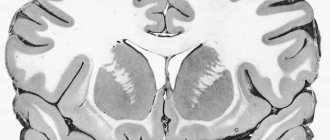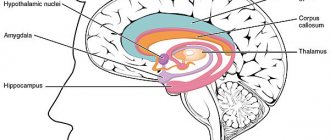| Ambivalence | |
| Ambivalence in a person can manifest itself in the area of feelings, ideas and judgments, in the choice of decisions, when desires or aspirations arise. | |
| ICD-11 | MB24.0MB24.0 |
Ambivalence
(from Lat. ambo - “both” and Lat. valentia - “strength”) - duality (splitting) of an attitude towards something, in particular - duality of experience, expressed in the fact that the same object evokes in a person at the same time two opposite feelings.
History of the concept
The term was introduced by Eugen Bleuler. He considered ambivalence to be the main symptom of schizophrenia or, more broadly speaking, schizoidism in general,[1] and therefore identified three types of ambivalence[1]:
- Emotional
: simultaneously positive and negative feeling towards a person, object, event (for example, in relation to children towards parents). - Volitional
: endless fluctuations between opposing decisions, the inability to choose between them, often leading to refusal to make a decision at all. - Intellectual
: alternation of contradictory, mutually exclusive ideas in a person’s reasoning.
His contemporary Sigmund Freud put a different meaning into this term. He viewed ambivalence as the coexistence of two inherently opposing deep-seated drives, the most fundamental of which are the drive to life and the drive to death.
Diagnostic measures
Ambivalence is not an independent pathology. In this sense, she does not need treatment. However, often this contradictory condition is a symptom of a serious mental disorder, in particular schizophrenia, depression, neurosis, psychosis, and various phobias.
Diagnosis of the condition is carried out by a specialist - do not try to do this yourself. To determine violations, testing is carried out using the Kaplan, Priester or Petty method.
Here's a typical set of questions:
- I easily pour out my soul to my interlocutor.
- I am always ready to discuss my problems with strangers.
- I am not shy about being frank with others.
- I'm afraid that I will be ignored.
- I'm worried that I'm not fun.
- I hate being dependent on someone.
Modern interpretation
| This article or section contains a list of sources or external references, but the sources of individual statements remain unclear due to a lack of footnotes. Claims that are not supported by sources may be questioned and removed. You can improve the article by providing more accurate citations to your sources. |
In modern psychology there are two understandings of ambivalence:
- In psychoanalysis, ambivalence usually refers to the complex range of feelings that a person experiences towards someone. It is assumed that ambivalence is normal in relation to those whose role in the life of the individual is also ambiguous. Unipolarity of feelings (only positive or only negative) is interpreted rather as a manifestation of idealization or devaluation, that is, it is assumed that the feelings are in fact most likely ambivalent, but the individual does not realize this (see also reactive education).
- In clinical psychology and psychiatry, ambivalence is understood as a periodic global change in an individual’s attitude towards someone: just last night the patient experienced only positive feelings towards a certain person, this morning - only negative, and now - again only positive. In psychoanalysis, this change in attitude is usually called "splitting of the ego."
Treatment methods
As stated above, special treatment for the state of ambivalence is not required. However, if the doctor has established mental disorders, drug therapy includes a complex of antipsychotics and tranquilizers.
Photo: creatively.ca
A technique for self-correction of ambivalence without medications.
- Take some time for yourself to understand the reasons for your discomfort. Write down your ambivalent feelings, thoughts or fears and the different scenarios in which they occur.
- Remind yourself that no situation is absolutely ideal, and that all potential scenarios have their strengths and weaknesses. Acknowledge and respect your ambivalent feelings. Be compassionate with yourself.
- Take your time to make a decision. Seek guidance if necessary. Remind yourself that no situation is 100% ideal and that all potential scenarios have their strengths and weaknesses.
- Determine your readiness for change. Identify your personal qualities that support positive, well-defined change and connect with them.
- Make choices that are consistent with yourself and stand by your decision.
- Evaluate your progress. Make changes if necessary.
Literature
- Webster's New World Collegiate Dictionary, 3rd Edition.
- Van Harreveld, F., van der Pligt, J., & de Liver, Y. (2009). The agony of ambivalence and ways to resolve it: Introducing the MAID model. Personality and Social Psychology Review, 13, 45-61.
- Sigmund Freud: Trois essais sur la théorie sexuelle (1905), Gallimard, collection Folio, 1989 (ISBN 2-07-032539-3)
- Analyze d'une phobie d'un petit garçon de cinq ans: Le Petit Hans (1909), PUF, 2006 (ISBN 2-13-051687-4)
- L'Homme aux rats : Journal d'une analysis (1909), PUF, 2000 Modèle:ISBN 2-13-051122-8
- Cinq psychanalyse (Dora, L'homme aux Loup, L'homme aux rats, Petit Hans, Président Schreber), rééd, traduction revisées, PUF Quadige (ISBN 2-13-056198-5)
- La dynamique du transfert (1912)
Excerpt characterizing Ambivalence
The prince grew very old this year. Sharp signs of old age appeared in him: unexpected falling asleep, forgetfulness of immediate events and memory of long-standing ones, and the childish vanity with which he accepted the role of head of the Moscow opposition. Despite the fact that when the old man, especially in the evenings, came out to tea in his fur coat and powdered wig, and, touched by someone, began his abrupt stories about the past, or even more abrupt and harsh judgments about the present, he aroused in all his guests the same feeling of respectful respect. For visitors, this entire old house with huge dressing tables, pre-revolutionary furniture, these footmen in powder, and the cool and smart old man himself from the last century with his meek daughter and pretty French girl, who revered him, presented a majestically pleasant sight. But the visitors did not think that in addition to these two or three hours, during which they saw the owners, there were another 22 hours a day, during which the secret inner life of the house took place. Recently in Moscow this inner life has become very difficult for Princess Marya. In Moscow she was deprived of those best joys - conversations with God's people and solitude - which refreshed her in Bald Mountains, and did not have any of the benefits and joys of metropolitan life. She did not go out into the world; everyone knew that her father would not let her go without him, and due to ill health he himself could not travel, and she was no longer invited to dinners and evenings. Princess Marya completely abandoned hope of marriage. She saw the coldness and bitterness with which Prince Nikolai Andreich received and sent away young people who could be suitors, who sometimes came to their house. Princess Marya had no friends: on this visit to Moscow she was disappointed in her two closest people. M lle Bourienne, with whom she had previously been unable to be completely frank, now became unpleasant to her and for some reason she began to move away from her. Julie, who was in Moscow and to whom Princess Marya wrote for five years in a row, turned out to be a complete stranger to her when Princess Marya again became acquainted with her in person. Julie at this time, having become one of the richest brides in Moscow on the occasion of the death of her brothers, was in the midst of social pleasures. She was surrounded by young people who, she thought, suddenly appreciated her merits. Julie was in that period of the aging society young lady who feels that her last chance for marriage has come, and now or never her fate must be decided. Princess Marya remembered with a sad smile on Thursdays that she now had no one to write to, since Julie, Julie, from whose presence she did not feel any joy, was here and saw her every week. She, like an old emigrant who refused to marry the lady with whom he spent his evenings for several years, regretted that Julie was here and she had no one to write to. Princess Marya had no one in Moscow to talk to, no one to confide in her grief, and much new grief had been added during this time. The time for Prince Andrei's return and his marriage was approaching, and his order to prepare his father for this was not only not fulfilled, but on the contrary, the matter seemed completely ruined, and the reminder of Countess Rostova infuriated the old prince, who was already out of sorts most of the time . A new grief that had recently increased for Princess Marya was the lessons that she gave to her six-year-old nephew. In her relationship with Nikolushka, she recognized with horror the irritability of her father. No matter how many times she told herself that she shouldn’t allow herself to get excited while teaching her nephew, almost every time she sat down with a pointer to learn the French alphabet, she so wanted to quickly and easily transfer her knowledge from herself into the child, who was already afraid that there was an aunt She would be angry that at the slightest inattention on the part of the boy she would flinch, hurry, get excited, raise her voice, sometimes pull him by the hand and put him in a corner. Having placed him in a corner, she herself began to cry over her evil, bad nature, and Nikolushka, imitating her sobs, left the corner without permission, approached her, pulled her wet hands away from her face, and consoled her. But what brought the princess more, more grief, was her father’s irritability, always directed against his daughter and recently reaching the point of cruelty. If he had forced her to bow all night, if he had beaten her and forced her to carry firewood and water, it would never have occurred to her that her position was difficult; but this loving tormentor, the most cruel because he loved and tormented himself and her for that reason, deliberately knew how not only to insult and humiliate her, but also to prove to her that she was always to blame for everything. Lately, a new feature had appeared in him, one that tormented Princess Marya most of all - it was his greater rapprochement with m lle Bourienne. The thought that came to him, in the first minute after receiving news of his son’s intentions, that if Andrei marries, then he himself would marry Bourienne, apparently pleased him, and he stubbornly recently (as it seemed to Princess Marya) only in order to insult her, he showed special affection to m lle Bourienne and showed his dissatisfaction with his daughter by showing love for Bourienne.










